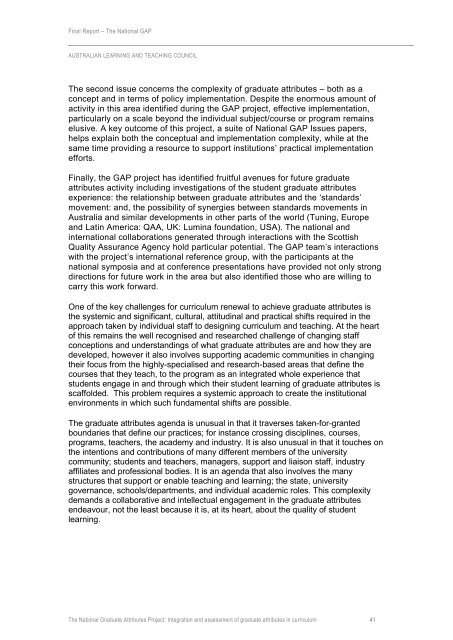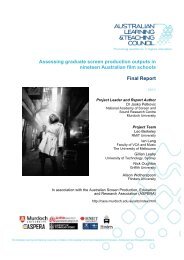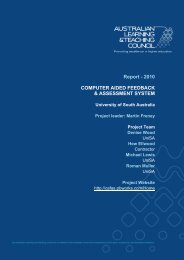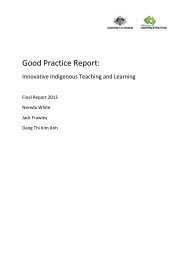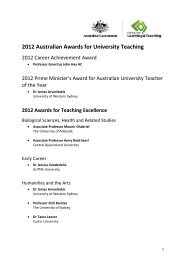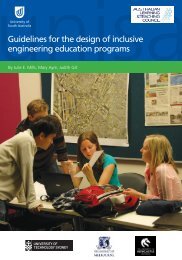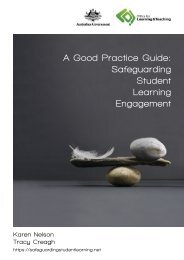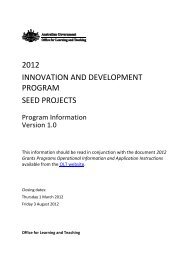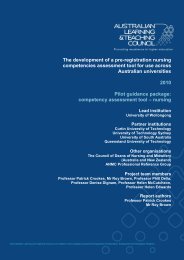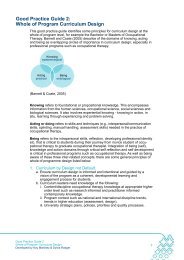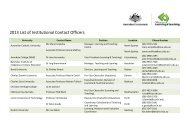The National Graduate Attributes Project - Institute for Teaching and ...
The National Graduate Attributes Project - Institute for Teaching and ...
The National Graduate Attributes Project - Institute for Teaching and ...
- No tags were found...
Create successful ePaper yourself
Turn your PDF publications into a flip-book with our unique Google optimized e-Paper software.
Final Report – <strong>The</strong> <strong>National</strong> GAPAUSTRALIAN LEARNING AND TEACHING COUNCIL<strong>The</strong> second issue concerns the complexity of graduate attributes – both as aconcept <strong>and</strong> in terms of policy implementation. Despite the enormous amount ofactivity in this area identified during the GAP project, effective implementation,particularly on a scale beyond the individual subject/course or program remainselusive. A key outcome of this project, a suite of <strong>National</strong> GAP Issues papers,helps explain both the conceptual <strong>and</strong> implementation complexity, while at thesame time providing a resource to support institutions’ practical implementationef<strong>for</strong>ts.Finally, the GAP project has identified fruitful avenues <strong>for</strong> future graduateattributes activity including investigations of the student graduate attributesexperience: the relationship between graduate attributes <strong>and</strong> the ‘st<strong>and</strong>ards’movement: <strong>and</strong>, the possibility of synergies between st<strong>and</strong>ards movements inAustralia <strong>and</strong> similar developments in other parts of the world (Tuning, Europe<strong>and</strong> Latin America: QAA, UK: Lumina foundation, USA). <strong>The</strong> national <strong>and</strong>international collaborations generated through interactions with the ScottishQuality Assurance Agency hold particular potential. <strong>The</strong> GAP team’s interactionswith the project’s international reference group, with the participants at thenational symposia <strong>and</strong> at conference presentations have provided not only strongdirections <strong>for</strong> future work in the area but also identified those who are willing tocarry this work <strong>for</strong>ward.One of the key challenges <strong>for</strong> curriculum renewal to achieve graduate attributes isthe systemic <strong>and</strong> significant, cultural, attitudinal <strong>and</strong> practical shifts required in theapproach taken by individual staff to designing curriculum <strong>and</strong> teaching. At the heartof this remains the well recognised <strong>and</strong> researched challenge of changing staffconceptions <strong>and</strong> underst<strong>and</strong>ings of what graduate attributes are <strong>and</strong> how they aredeveloped, however it also involves supporting academic communities in changingtheir focus from the highly-specialised <strong>and</strong> research-based areas that define thecourses that they teach, to the program as an integrated whole experience thatstudents engage in <strong>and</strong> through which their student learning of graduate attributes isscaffolded. This problem requires a systemic approach to create the institutionalenvironments in which such fundamental shifts are possible.<strong>The</strong> graduate attributes agenda is unusual in that it traverses taken-<strong>for</strong>-grantedboundaries that define our practices; <strong>for</strong> instance crossing disciplines, courses,programs, teachers, the academy <strong>and</strong> industry. It is also unusual in that it touches onthe intentions <strong>and</strong> contributions of many different members of the universitycommunity; students <strong>and</strong> teachers, managers, support <strong>and</strong> liaison staff, industryaffiliates <strong>and</strong> professional bodies. It is an agenda that also involves the manystructures that support or enable teaching <strong>and</strong> learning; the state, universitygovernance, schools/departments, <strong>and</strong> individual academic roles. This complexitydem<strong>and</strong>s a collaborative <strong>and</strong> intellectual engagement in the graduate attributesendeavour, not the least because it is, at its heart, about the quality of studentlearning.<strong>The</strong> <strong>National</strong> <strong>Graduate</strong> <strong>Attributes</strong> <strong>Project</strong>: Integration <strong>and</strong> assessment of graduate attributes in curriculum 41


